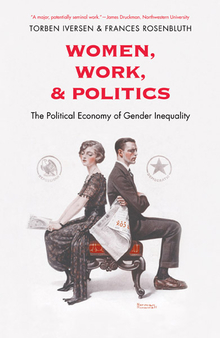Responsible Parties
WARNING
You are viewing an older version of the Yalebooks website. Please visit out new website with more updated information and a better user experience: https://www.yalebooks.com
Saving Democracy from Itself
Frances McCall Rosenbluth and Ian Shapiro
How popular democracy has paradoxically eroded trust in political systems worldwide, and how to restore confidence in democratic politics
Democracies across the world are adopting reforms to bring politics closer to the people. Parties have turned to primaries and local caucuses to select candidates. Ballot initiatives and referenda allow citizens to enact laws directly. Many democracies now use proportional representation, encouraging smaller, more specific parties rather than two dominant ones. Yet voters keep getting angrier. There is a steady erosion of trust in politicians, parties, and democratic institutions, culminating most recently in major populist victories in the United States, the United Kingdom, and elsewhere. Frances Rosenbluth and Ian Shapiro argue that devolving power to the grass roots is part of the problem, not the solution. Efforts to decentralize political decision-making make governments and especially political parties less effective and less able to address constituents’ long-term interests. To revive confidence in governance, we must restructure our political systems to restore power to the core institution of representative democracy: the political party.
Democracies across the world are adopting reforms to bring politics closer to the people. Parties have turned to primaries and local caucuses to select candidates. Ballot initiatives and referenda allow citizens to enact laws directly. Many democracies now use proportional representation, encouraging smaller, more specific parties rather than two dominant ones. Yet voters keep getting angrier. There is a steady erosion of trust in politicians, parties, and democratic institutions, culminating most recently in major populist victories in the United States, the United Kingdom, and elsewhere. Frances Rosenbluth and Ian Shapiro argue that devolving power to the grass roots is part of the problem, not the solution. Efforts to decentralize political decision-making make governments and especially political parties less effective and less able to address constituents’ long-term interests. To revive confidence in governance, we must restructure our political systems to restore power to the core institution of representative democracy: the political party.
Frances McCall Rosenbluth (1958–2021) was the Damon Wells Professor of Political Science and Ian Shapiro is Sterling Professor of Political Science, both at Yale University.
“A trenchant and fiercely argued diagnosis of the growing pathology of representative democracy.”—John Dunn, Emeritus Professor of Political Theory and Fellow of King's College, Cambridge
"Democracies that serve majorities over the long run require strong, cohesive legislative parties. Full stop. In their brilliant analysis of party systems across post-industrial democracies—steeped in the latest scholarship, animated by dramatic stories, and made urgent by the dangerous flowering of extremist parties and demagogues—Rosenbluth and Shapiro serve as expert, impassioned guides to why we must have strong parties and why, in efforts to be more representative, parties everywhere are failing democracy."—Nancy Rosenblum, Senator Joseph S. Clark Research Professor of Ethics in Politics and Government, Harvard University
"One of the best books in many years on comparative democratic politics . . . compelling, courageous, and unconventional . . . A must read for anyone interested in how to restore the vitality of our democratic institutions and politics."—Richard H. Pildes, Sudler Family Professor of Constitutional Law, NYU School of Law
“Other political parties across the Western world have, in the past few years, experienced hostile takeovers of their own . . . Responsible Parties is one of the first books to give serious attention to the political effects of this transformation.”—Yascha Mounk, New Yorker
"[A] thoughtful and elegant book"—James E. Cronin, Commonwealth and Comparative Politics
“Compelling reading. . . . Thoughtful and elegant. . . . a well-informed tour of the state of democratic politics and their political systems. . . . Their descriptions, and the historical backgrounds they sketch . . . are unfailingly helpful.”—James E Cronin, Commonwealth and Comparative Politics
ISBN: 9780300251944
Publication Date: March 17, 2020
Publication Date: March 17, 2020
336 pages, 5 1/2 x 8 1/4
12 b/w illus.
12 b/w illus.














